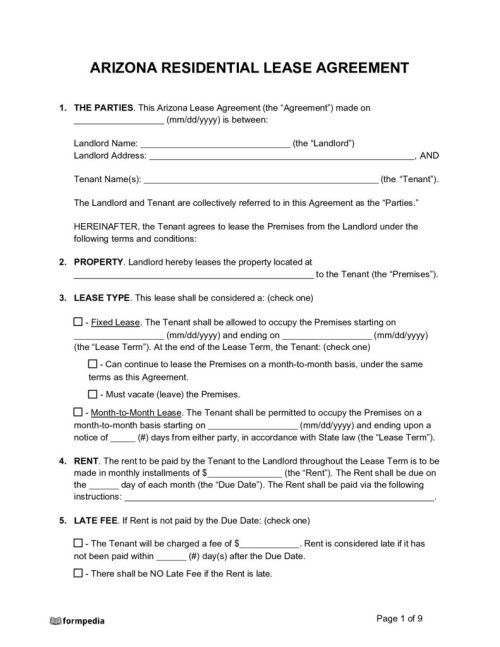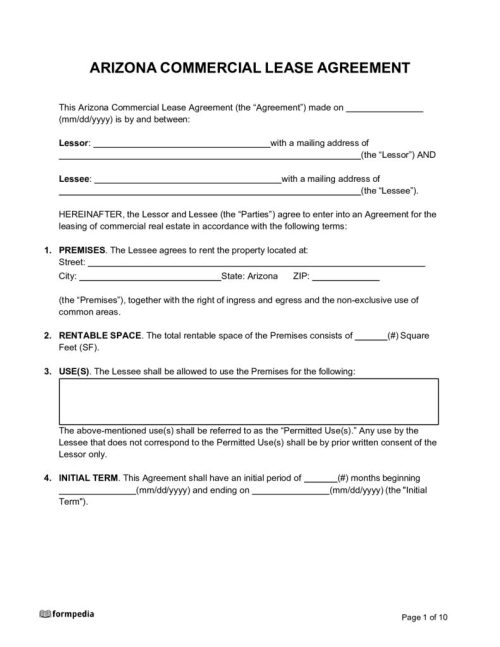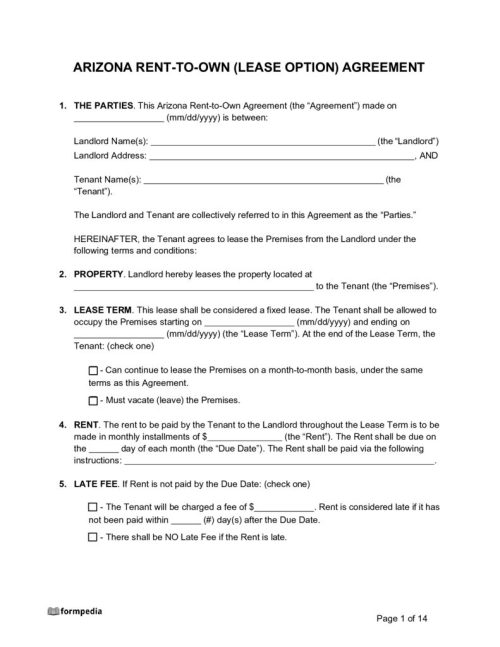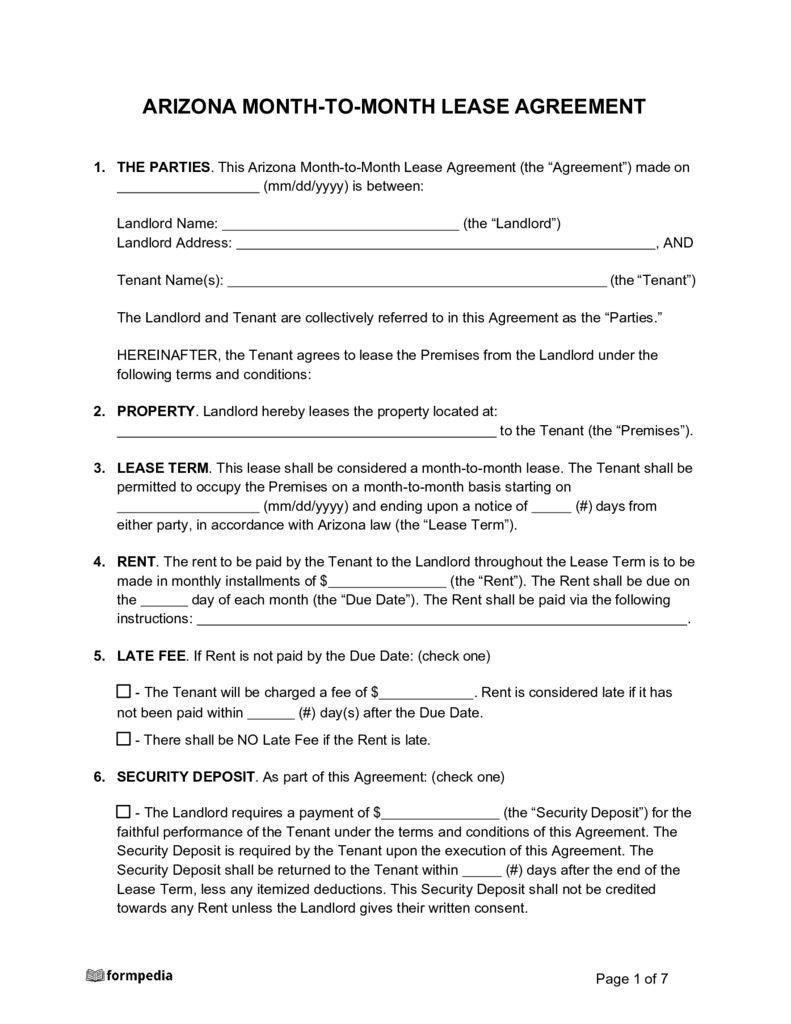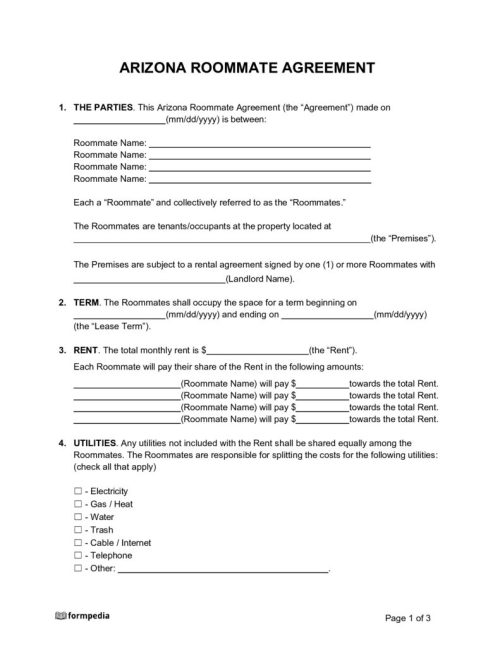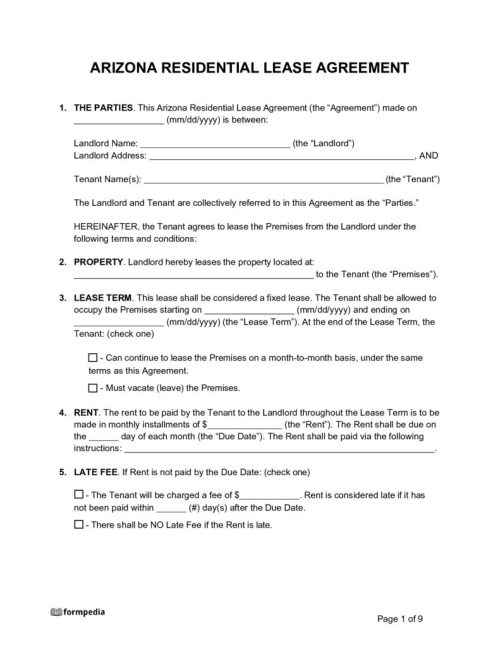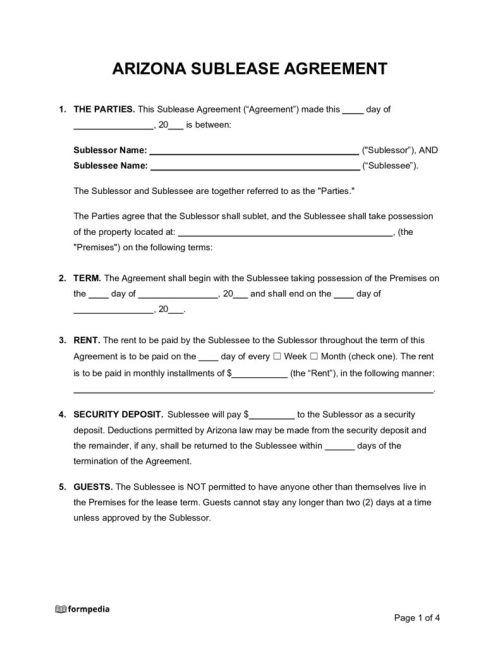Arizona rental lease agreements are legally binding contracts governed by the ARS, Title 33, Chapter 3, also known as the Arizona Residential Landlord and Tenant Act. This Act provides a comprehensive legal framework that outlines landlords’ and tenants’ rights, obligations, and remedies. It covers various aspects, from rental payments and security deposits to property maintenance and lease termination.
Lease Agreements: By Type (6)
Commercial Lease Agreement
This agreement is used for leasing a property for business purposes. It must comply with the general provisions of the Arizona Landlord and Tenant Act.
Rent-to-Own Agreement (Lease Option)
This agreement allows a tenant to rent a property with the option to purchase it later. The specific terms about the purchase option must be clearly outlined in the agreement.
Month-to-Month Lease Agreement
This agreement renews every month and can be terminated by either party with a 30-day notice. Any changes to the terms of the lease must also be given with a 30-day notice.
Roommate Agreement
This agreement outlines the responsibilities of each co-tenant in a rental property. It's not specifically regulated by the Arizona Landlord and Tenant Act, but it's a good idea to have one to prevent disputes.
Standard (1-year) Lease Agreement
This is a common type of residential lease that lasts for a fixed term, typically one year. Any changes to the lease terms can only be made after the lease period ends, unless the lease itself provides for changes.
Sublease Agreement
This agreement allows a tenant to rent out their leased property to a third party. The original tenant remains responsible for the property and must comply with all original lease terms.
Landlord and Tenant Act, Simplified
The Arizona Revised Statutes Title 33, Chapter 3, and Chapter 10 serves as the governing body for rental lease agreements in Arizona. This comprehensive Act explains the various elements of a rental agreement, providing a clear framework for both landlords and tenants. Each segment of the Act meticulously outlines the obligations and responsibilities that both parties must adhere to during the tenancy.
Required Disclosures
The Arizona Landlord and Tenant Act, as well as other relevant federal laws, outline several critical disclosures that landlords must provide to tenants. Here’s a simplified breakdown of each:
Landlord and Manager Information (A.R.S. § 33-1322): The landlord or any person authorized to enter into a rental agreement on their behalf must disclose to the tenant in writing at or before the commencement of the tenancy the name and address of each of the following:
-
-
- The person authorized to manage the premises.
- An owner of the premises or a person authorized to act for and on behalf of the owner for the purpose of service of process and receiving and receipting for notices and demands.
-
Lead-Based Paint Disclosure: For any property built before 1978, landlords must provide tenants with an EPA-approved information pamphlet about lead-based paint hazards. Section 1018 of Title X requires disclosing any known information concerning lead-based paint or lead-based paint hazards. The landlord must also include a lead warning statement in the lease and provide the tenant with a lead hazard evaluation report if one exists.
Bedbug Disclosure (A.R.S. § 33-1319): Landlords must provide educational materials about bedbugs to existing and new tenants.
Move-In Checklist (A.R.S. § 33-1321): If a landlord collects a security deposit, the landlord must provide the tenant with a signed copy of the lease, a form to specify any existing damages, and written notification that the tenant may be present at the move-out inspection.
Disclosure of Landlord-Tenant Act (A.R.S. § 33-1322): The landlord must inform the tenant in writing that the Arizona Residential Landlord and Tenant Act is available on the Arizona Department of Housing’s website.
Rent Regulations and Guidelines
- Rent Payment (A.R.S. § 33-1314): Rent is payable without demand or notice at the time and place agreed upon by the parties. Unless otherwise agreed, rent is expected at the dwelling unit, and periodic rent is payable at the beginning of any term of one month or less and otherwise in equal monthly installments at the beginning of each month.
- Rent Control: The state of Arizona has specific guidelines regarding rent control. As per A.R.S. § 33-1329, the state preempts the power to control rents on private residential property, meaning cities or towns do not have the power to control rents.
Security Deposits (A.R.S. § 33-1321)
- Deposit Limit: A landlord cannot demand or receive security, including prepaid rent, in an amount or value of more than one and one-half month’s rent. However, this does not prohibit a tenant from voluntarily paying more than one and one-half month’s rent in advance.
- Use of Deposit: Upon termination of the tenancy, property or money held by the landlord as prepaid rent and security may be applied to the payment of all rent and all charges as specified in the signed lease agreement or as provided in this chapter; this includes the landlord’s damages due to the tenant’s noncompliance with the Dwelling Maintenance clause of Arizona Revised Statutes.
Terms and Conditions in a Rental Agreement (A.R.S. § 33-1314)
- Inclusion of Terms: The landlord and tenant can include terms and conditions not prohibited by this chapter or any other rule of law in a rental agreement. This includes rent, terms of the agreement, and other provisions governing the rights and obligations of the parties.
- Absence of Agreement: In the absence of a rental agreement, the tenant is required to pay as rent the fair rental value for the use and occupancy of the dwelling unit.
- Tenancy Term: Unless the rental agreement fixes a definite term, the tenancy shall be week-to-week in case of a roomer who pays weekly rent and, in all other cases, month-to-month.
- Authorized Contact: The landlord may request, and the tenant may provide and routinely update, the name and contact information of a person the tenant authorizes to enter the tenant’s dwelling unit to retrieve and store the tenant’s property, including the tenant’s animal, if the tenant dies or is otherwise incapacitated.
Frequently Asked Questions
- What is the maximum security deposit a landlord can charge in Arizona?
- Can a landlord increase the rent during the lease period in Arizona?
- What are the landlord's obligations regarding disclosures in Arizona?
- What happens to a tenant's property if they pass away or become incapacitated in Arizona?
- What happens if there is no rental agreement in place in Arizona?
What is the maximum security deposit a landlord can charge in Arizona?
In Arizona, a landlord can charge a security deposit equivalent to one and a half month’s rent. For example, if the monthly rent is $1000, the maximum security deposit would be $1500.
Can a landlord increase the rent during the lease period in Arizona?
Unless specified in the lease agreement, a landlord cannot increase the rent during the lease period. However, if a municipality changes the transaction privilege tax on residential rent, the landlord can adjust the rent to reflect this change.
What are the landlord's obligations regarding disclosures in Arizona?
The landlord must disclose the names and addresses of the property manager and the property owner. They must also inform the tenant that the Arizona Residential Landlord and Tenant Act is available on the Arizona Department of Housing’s website.
What happens to a tenant's property if they pass away or become incapacitated in Arizona?
In Arizona, a tenant can provide the landlord with the contact information of a person authorized to retrieve their property, including pets, in case of death or incapacitation. If the authorized person fails to respond within a specified time, the landlord can dispose of the property or remove the pet to an animal shelter.
What happens if there is no rental agreement in place in Arizona?
If there is no rental agreement, the tenant is expected to pay the fair rental value for the use and occupancy of the dwelling unit. The tenancy is considered week-to-week for a roomer who pays weekly rent, and month-to-month in all other cases.
